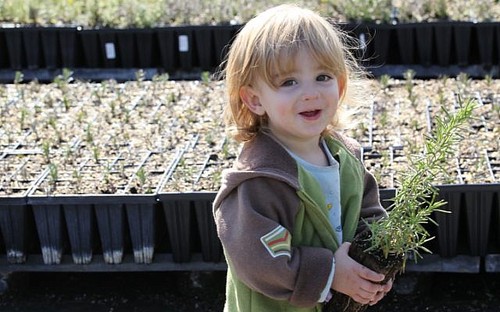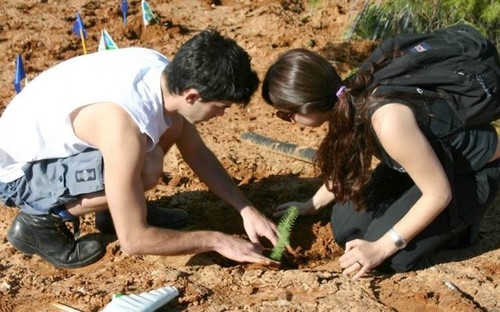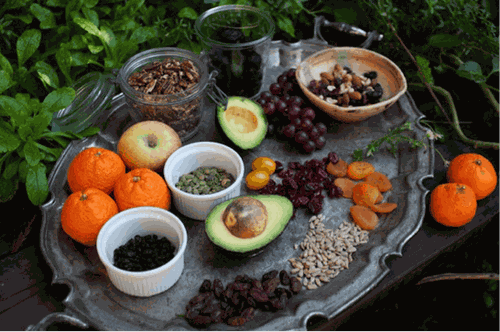 A scientist in the field of micro-bioecology, Nguyen Thanh Dung has also earned fame being a freelance romance writer with the pen name Moc Lam. A scientist in the field of micro-bioecology, Nguyen Thanh Dung has also earned fame being a freelance romance writer with the pen name Moc Lam.
|
Ngoc Diep: Welcome to the show, Dung. Please tell us a bit about you. How long have you been living in Israel and what are you doing there?
Thanh Dung: Hello everyone, I’m Dung, I’ve been living in Israel for more than 2 years and now I’m doing my PhD in the field of micro-bioecology. Personally I found the journey to Israel up to this point is very fruitful for my personal development in many ways but mostly thanks to the rich culture that I can learn new things nearly everyday.
 An Israeli toddler chooses seedlings to plant ahead of the Jewish nature holiday Tu B'Shvat. (Nati Shohat/Flash90) Photo: https://www.timesofisrael.com An Israeli toddler chooses seedlings to plant ahead of the Jewish nature holiday Tu B'Shvat. (Nati Shohat/Flash90) Photo: https://www.timesofisrael.com |
Ngoc Diep: Israel is famous for its Jewish traditions and festivals. One of them is Tu Bishvat. What can you tell us about that day?
Thanh Dung: Tu B'Shevat is one of four Jewish new years. One of the best known is Rosh Hashana on the first day of the month of Tishrei. The New Year for kings and festivals is on the first day of the month of Nisan (or Nissan). The New Year for animal tithes is on the first day of the month of Elul.
 Volunteers plant trees in the Lehi Forest at Kibbutz Mishmar Ayalon. (Shmuel Bar-Am) Photo: https://www.timesofisrael.com Volunteers plant trees in the Lehi Forest at Kibbutz Mishmar Ayalon. (Shmuel Bar-Am) Photo: https://www.timesofisrael.com |
Ngoc Diep: What is special about Tu B'Shevat?
Thanh Dung: Tu B'Shevat, also known as Tu B'Shevet or Tu Bishvat, is the day that trees come of age according to Jewish law. According to some readings of Jewish law, fruit that ripened on a three-year-old tree before Tu BiShvat is considered “orlah” (which refers to a biblical prohibition on eating the fruit of trees produced during the first three years after they are planted) and is forbidden to eat, while fruit ripening on or after Tu BiShvat of the tree's third year is permitted. Tu B'Shevat marks the "new year" or "birthday" of trees.
Tu BiShvat is the Israeli Arbor Day, and it is often referred to by that name in international media. Ecological organizations in Israel and the diaspora have adopted the holiday to further environmental-awareness programs. On Israeli kibbutzim – “a communal farm or settlement in Israel”, Tu BiShvat is celebrated as an agricultural holiday.
In keeping with the idea of Tu BiShvat marking the revival of nature, many of Israel's major institutions have chosen this day for their inauguration. The cornerstone-laying of the Hebrew University of Jerusalem took place on Tu BiShvat 1918; the Technion in Haifa, on Tu BiShvat 1925; and the Knesset or Israeli parliament, on Tu BiShvat 1949.
Ngoc Diep: What exactly do people do on this day?
Thanh Dung: Jewish people mark this day by eating a symbolic meal of fruit and nuts or planting trees.
Some Jewish people began to hold a symbolic sedar (meal) on Tu B'Shevat after 1600 CE. This consisted of different types of fruit and nuts, each of which had a specific spiritual meaning. This custom is still alive for some Jewish groups.
Many Jewish people make a special effort to eat a meal consisting of dried fruit and nuts accompanied by red wine or grape juice. They often share this meal with family members and close friends. Some people pickle or candy the etrog (a citrus fruit) used at the ceremonies during Sukkot (a major Jewish festival held in the autumn) and eat it on Tu B'Shevat.
 A symbolic sedar (meal) on Tu B'Shevat. Photo: https://bethshalomseattle.org A symbolic sedar (meal) on Tu B'Shevat. Photo: https://bethshalomseattle.org |
Ngoc Diep: They also plant trees on this day, don’t they?
Thanh Dung: Sure they do. Many Jewish people, particularly in Israel and on kibbutzim, plant trees or take part in activities to further environmental awareness. In this respect, Tu B'Shevat has a lot in common with Arbor Day celebrations, a day set aside for schools, civic clubs, and other organizations, as well as individuals, to reflect on the importance of trees around the world.
Ngoc Diep: The day is pretty important in Jewish people’s spiritual life I think. So is Tu B'Shevat a public holiday in Israel?
Thanh Dung: Actually, Tu B'Shevat is not a public holiday in countries such as Israel, Australia, Canada, the United Kingdom or the United States. However, some Jewish organizations may be closed or offer a limited service to allow for festivities to occur on this day.
 Important symbols of Tu B'Shevat include different types of dried fruit arranged on a platter, flowering almond trees and the "seven species". Photo: https://jewishjournal.com/ Important symbols of Tu B'Shevat include different types of dried fruit arranged on a platter, flowering almond trees and the "seven species". Photo: https://jewishjournal.com/ |
Ngoc Diep: Are there any symbols of Tu B'Shevat in Israel?
Thanh Dung: Yes, there are. Important symbols of Tu B'Shevat include different types of dried fruit arranged on a platter, flowering almond trees and the "seven species". These are: Barley, Dates, Figs, Grapes, Olives, Pomegranates, and Wheat. The seven species are associated with the Land of Israel in the Torah so they have an important place in Jewish culture.
Ngoc Diep: Thank you so much, Dung, for talking to us about Tu B'Shevat - New Year for the trees in Israel. We wish you all the best in work and life.
Thanh Dung: Thank you for having me.